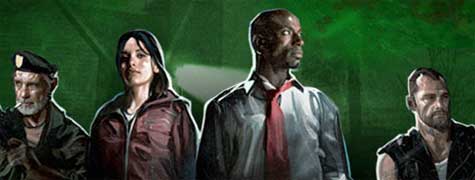-
"The Demo is a music theater work written by composer/performers Mikel Rouse and Ben Neill based on Douglas Engelbart’s historic 1968 demonstration of early computer technology." Wow.
Gating In Action
29 November 2011
I went to see a promenade production of a few of Pinter’s political plays the other week, put on by Hydrocracker at Shoreditch Town Hall. When I got out of it, it reminded me a lot of the way first person videogames gate progress through staged encounters. I wrote a bit about this for the Hide&Seek blog:
The security guards weren’t just human gating tools; they were good gating tools because they were human. A marine in a doorway in Call of Duty has a couple of repeated “barks” to explain why you can’t pass him. But a human actor can improvise, responding sympathetically and organically to the situation in front of them. The gates feel much less forced when you can have a dialogue with them.
It’s Better Because It’s Better
17 July 2010
I haven’t written up Wonderlab yet. Mainly because my brain’s still spinning, still exhausted from those three days, and threads are coming together slowly.
So, rather than one beautiful, succinct post… everything is dribbling out in pieces, I’m afraid.
I’m thinking a lot about what I term “Games Literacy” right now – more on what that means in the future, I guess, but suffice to say: it’s about knowing how to both read and write, and being able to read games rather than just consume them. But, in trying to explain my frustrations with the relatively low literacies of many games creators (real or someday), I couldn’t help but return to a speech from Tom Stoppard’s The Real Thing, so beautifully delivered by Toby Stephens in the Old Vic production that I was fortunate enough to see a month ago.
Henry is a writer, and his partner – Annie – is trying to get him to look at a script written by Brodie, a young man. Henry explains that Brodie can’t write; Annie is furious, and tells Henry that he’s being a snob – just because he’s a writer, why does he get to choose who gets to write or not?
Henry reaches for his cricket bat.
HENRY: Shut up and listen. This thing here, which looks like a wooden club, is actually several pieces of particular wood cunningly put together in a certain way so that the whole thing is sprung, like a dance floor. It’s for hitting cricket balls with. If you get it right, the cricket ball will travel two hundred yards in four seconds, and all you’ve done is give it a knock like knocking the top off a bottle of stout, and it makes a noise like a trout taking a fly… (He clucks his tongue to make the noise.) What we’re trying to do is to write cricket bats, so that when we throw up an idea and give it a little knock, it might … travel … (He clucks his tongue again and picks up the script.) Now, what we’ve got here is a lump of wood of roughly the same shape trying to be a cricket bat, and if you hit a ball with it, the ball will travel about ten feet and you will drop the bat and dance about shouting ‘Ouch!’ with your hands stuck into your armpits. (Indicating the cricket bat.) This isn’t better because someone says it’s better, or because there’s a conspiracy by the MCC to keep cudgels out of Lords. It’s better because it’s better. You don’t believe me, so I suggest you go out to bat with this and see how you get on. [quoting from the play] ‘You’re a strange boy, Billy, how old are you?”Twenty, but I’ve lived more than you’ll ever live.’ Ooh, ouch! (He drops the script and hops about with his hands in his armpits, going ‘Ouch!’ ANNIE watches him expressionlessly until he desists.)
The analogy stands alone, I think. But, were I to attempt to summarise: the goal of any kind of literacy is, you could say, understanding that you ought to be making cricket bats. And then you really only need the gentlest touch to make an impact.
(and of course: it’s a marvellous play, and the rest of this scene is just as relevant as these scant moments. Do see it if you get a chance).
-
"My main point brings me back to Pretending Apps. Because there are lots of other things you can steal from games, many other aspects of gaming that people find appealing and some of them might be more easily and usefully extracted." Yup. This was one of my main beefs with the whole "let's make everything playful/gamey!" trend that kicked off a few years ago: "game-y" was associated with "having points", and really, that's not what makes a game at all. (Other things that make a game: pretending, as Russell mentions, and visible mechanics, as I think I have to write about soon).
-
"There seems to be some sort of consensus that the highest form of play is fully immersive, interactive live theatre. Well not for me. The rhetoric of these things is often about people making their own choices, being free to act, creating their own narrative, etc, etc. And I always end up feeling like a piece, a pawn." Totally; not for me, either, though I'm not totally into "Social Toys" either – but Russell's points are perfectly valid and sensible. (I do like theatre, though). Probably ought to write more than a few hundred characters on this.
-
Solid illustration comedy gold, mainly from the 70s and 80s.
-
"A Bitter Aftertaste is a jeepform roleplaying game for four players that premiered at Ropecon, the Finnish national roleplaying games convention, in 2007. It is about two lovers who have just had the best sex of their lives, sitting on a balcony overlooking their city, and talking." Two players are the physical characters; the other two are their internal monologues and thoughts. Sounds wonderful – a combination of roleplaying and improv. An RPG designed for an audience.
-
"Earlier this week, 1.5 million people filled the streets of Berlin, Germany to watch a several-day performance by France's Royal de Luxe street theatre company titled "The Berlin Reunion". Part of the celebrations of the 20th anniversary of the fall of the Berlin Wall, the Reunion show featured two massive marionettes, the Big Giant, a deep-sea diver, and his niece, the Little Giantess. The storyline of the performance has the two separated by a wall, thrown up by "land and sea monsters". The Big Giant has just returned from a long and difficult – but successful – expedition to destroy the wall, and now the two are walking the streets of Berlin, seeking each other after many years apart. I'll let the photos below tell the rest of the story." Royal de Luxe are the same group who did "The Sultan's Elephant". Thought: it's all a bit Bioshock, isn't it?
-
The future of image processing and 3D graphics is awesome, bonkers, sort-of relevant and full of bunnies. Worth a watch.
Dangerous Mistakes In The Company Of Friends
08 June 2009
(or: ‘More Hudson, Less Hicks’)

“I’d like to introduce you to a close personal friend of mine.”
That close personal friend is Corporal Dwayne Hicks. James Cameron’s Aliens has many things to answer for – especially when it comes to the world of videogames – but I’d argue that in its characters, I see the archetypes of players on every Call of Duty 4 server I’ve visited, every Halo 3 TDM game I’ve joined. Hicks isn’t just a model of professionalism for the survivors of the USS Sulaco’s marine team; he’s a model for legions of gamers everywhere.
The online gaming world is full of Hickses. It’s why I don’t frequent public servers very often. I’m just bored of playing against people who seem to take no joy in their games; just a dreary sense of workmanlike competence. Somehow our games have managed to emphasise competence, professionalism, and dead-eye accuracy over having fun. Perhaps not emphasise; perhaps they go further, fetishizing skill – the reams of statistics detailing kill ratios, the obsession with XP, score, and rank, is often taken by players to be not a part of the game, but the reason to play it. And that seems sad.
Because whilst being the best, and having the best ratio, or the best kit is part of the fun of games, a lot of the fun of online gaming comes from a peculiar kind of theatre that emerges from the best online games.
Not messing around, breaking the rules – that’s no fun – but the kind of play that emerges when you succeed badly. Succeeding despite your skills, rather than because of them.
To go back to Aliens a moment: really, I’d like it if more gamers were more like Bill Paxton’s Private Hudson.

“Game over, man! Game over!”
No, really. Sure, Hudson is a similarly competent professional to his NCO, and I can’t deny that he doesn’t fetishize his toys a little… but he’s also the soul of the party. He’s the goofball you can trust with your life. (Which, now I come to think of it, is Bill Paxton’s stock-in-trade). I’d take a legion of stumbling, wise-cracking Hudsons over a dour Corporal Hicks any day.
And nowhere is this more obvious than in Left 4 Dead.
Lee described the joy of Left 4 Dead as “making dangerous mistakes in the company of friends“. What could be better than that? Taking risks, sometimes being punished, usually being chastised, but then having a chance to redeem yourself, with the people you love? That sounds like the best kind of gaming. Better than competence any day.
And it sounds a lot like a Left 4 Dead campaign a few of us ran a few weeks ago. Time for a story!

It’s the end of the third map of Dead Air – the escape over the skybridge – and the four of us have got to the outside of the airport. We’re a bit worse for wear – we haven’t been bringing our A-games – and by the time we get to the multi-storey carpark, we’re on our last legs; a tank and two horde encounters outside the airport took its toll.
So we decide to run.
It is, after all, not far from the car park to the other side of the skybridge.
We belt it through the carpark, capping the odd zombie on the way, and make it to the safe room. All three of us make it to the safe room.
Jones – who is playing Louis – is nowhere to be seen. We yell for him, and, with our magic Survivor X-Ray vision, see that he’s back outside the carpark. Uh-oh.
So we yell for him to come upstairs. We’ll leave him behind in a heartbeat if we have to, but for now, he deserves a fair crack of the whip. So we watch, as X-Ray Louis limps his way into the carpark. He might just make it.
And then he sets off a car alarm, and we hear the baying of the zombie horde.
What went from being a minor cock-up is now a hilarious balls-up of the highest order. Alice and Mike hunker down in the safe room – sensible them – and I take up position crouched in the corner of the skybridge, assault-rifle ready.
(I am playing Bill, and taking the role-playing of the gruff old veteran a little seriously for the purposes of drama).
“Come on, Matt,” we cheer, and soon we see Louis limping through into the corridor of the skybridge. He’s about halfway down the corridor when the express-train that is the zombie horde piles through the door behind him.
I dump an entire clip of rifle ammo into the zombie-train; Jones gets into the safe room; the gun clicks dry and I run back through the doorway –
– straight into the arms of about eight zombies. This is not, in fact, the safe room. It is an amusingly-positioned closet next to the safe room. Desperately, I bash as hard as I can, scrabbling through the horde, and into safety next door.
Somebody, I forget whom, fends off the crowd of zombies I appear to have dragged into the safe room with me, and the door slams shut.
Not only have we survived, we have also not stopped laughing since the car alarm went off. It’s possibly my favourite Left 4 Dead experience ever. We didn’t survive a round on Expert, we didn’t get an all-headshot round, we didn’t drop a Tank with no damage. We messed up, we made stupid mistakes, and as a result it was more like a zombie movie than any perfect run could be. Together, we made a strange kind of consensual theatre, and we still survived, and it was all an absurd amount of fun. (This session is also is one of the many reasons I’m very excited that Valve are introducing Gauntlets – hectic, running-chase Finales – to Left 4 Dead 2).
I don’t play videogames because I want to have competent, professional militaristic encounters with friends. I’d take Dangerous Mistakes In The Company Of Friends over competence any day. Sure, they may be mistakes, but they’re dangerous! They’re exciting! And sometimes, they make the game better than it ever could be when you play it “right”. I wouldn’t want it any other way.
-
"With no planning, we all started acting as if we were people in a real office. Almost immediately we began to adopt characters and send officious announcements. Soon we were referring to characters in the office who didn’t exist in real life. Meeting rooms were booked, couriers arrived, servers went down, timesheets were requested, and embarrassing emails were accidentally sent to everyone in the company." Phil is right; it's a wonderful, bonkers piece of improv-email theatre.
-
"Record gives you unlimited audio tracks, world class effects and mixing gear, and a whole new take on music recording." Lovely: seamless Reason integration, virtual Line6 Pods, and a DAW-ish bit of software that works the way my brain does. Excited!
-
"In this article, let us review 15 practical examples of Linux find command that will be very useful to both newbies and experts." I've never really understood find, so these are very helpful.
-
"This jQuery plugin generates sparklines (small inline charts) directly in the browser using data supplied either inline in the HTML, or via javascript." Nifty.
-
"…when we step into the shoes of that avatar, be it 1st-person, 3rd-person or otherwise, we exit the darkened movie theater paradigm and enter an intricate, performative, exploratory lab of untested ideas and speculation. We enter a playful space that feels and responds much more like a live theater rehearsal than an interactive movie or a triggered series of movie clips." Michael debunks the games-as-cinema analogy with an interesting take that considers them as more like theatre rehearsal.
-
"This is not a book about the VCS, nor breakout, nor video games and video game culture; it is a chronicle of the experience of that entity we might call “the player.” Oddly, there is little I can take from it in terms of approaches to video gaming or thoughts on the VCS Breakout. But it did enlarge my perspective and help me think about physiological, cognitive, and, let us say, monomaniacal aspects of video game play. Nervous, very dreadfully nervous Sudnow has been, but why would I say that he is mad?" Sudnow passed away very recently; I really ought to read his book, more than ever.
-
"[s3fm]… lets anyone run a streaming radio station, with just a folder of MP3s. Put those MP3s in an Amazon S3 bucket, and give your friends the S3 FM link."
-
Matt's talk (in English) from Lift 09, on scientific fiction, stories, and the design process. Good stuff – not too long – and wonderfully filmed: the cameraman focuses on his hands as much as his face, which is just perfect.
-
NeoGAF users band together to make a perfect, eight-stage, LittleBigPlanet rendition of Contra. Remarkable, especially the behind-the-backdrop puppeteering that makes the walking-into-the-screen levels possible. This had better not get a takedown slapped on it, because it's phenomenal.
-
"Perfect gift for any World of Warcraft player or other MMORPGer in general. You get one "main" glass and one "alt" glass. Serving idea: fill your main with your alcoholic beverage and your alt with your chaser since mains are typically stronger than alts." Oh dear. (But: good gag, and dangerous for drinking games).
-
"SFZero is a Collaborative Production Game. Players build characters by completing tasks for their groups and increasing their Score. The goals of play include meeting new people, exploring the city, and participating in non-consumer leisure activities."
-
"One of my enduring passions is exploring graphic design with programmatic and generative systems. While some aspects of design require the skilled hand of the designer, others can be formalized and explored by computer. For those tasks, Mathematica is an exceptional tool." Some lovely thinking around generative design.